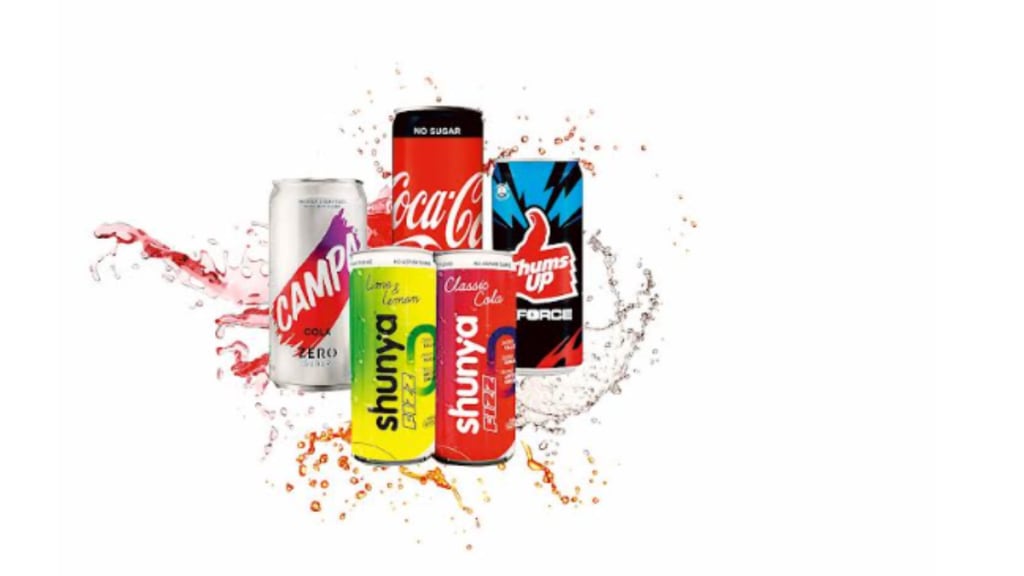Even a small slice of the large market can translate to big business for brands.
Reliance Consumer Products (RCPL) recently acquired a majority stake in a joint venture with Naturedge Beverages, which produces the Shunya brand of zero-sugar, herb-infused beverages. This move gives Reliance a firmer grip on the healthy functional beverage market — the company’s sugar-free portfolio now includes two offerings, Shunya and Campa Cola Zero Sugar — and some control over Naturedge’s flagship brand and distribution network.
With Indian consumers increasingly displaying a growing preference for healthier snacks and beverages, soft drink behemoths PepsiCo, Coca-Cola and Reliance’s Campa Cola are doubling down on their zero-sugar portfolio.
Thums Up, which launched Thums Up XForce earlier this year, saw over 1,00,000 pre-bookings ahead of its launch. PepsiCo India, as per published reports, saw 55% of its sales volumes come from low-sugar drinks in the first half of the current calendar year. The company now has no-sugar offerings from 7UP, Pepsi (Black) and Gatorade in India.
Trends show pricing, which was once a barrier for low-sugar drinks, is no longer a concern. All three major beverage makers now have low sugar offerings priced at 10. As per industry estimates, the Indian market for zero-sugar beverages doubled in CY24 to reach around700-750 crore. The segment now accounts for around 10% of India’s non-alcoholic beverage market.
Nikhil Sethi, partner and national leader for consumer goods at KPMG in India says that this segment is expected to see significant expansion with double digit growth fuelled by increasing awareness around preventive health, wider distribution and product innovation. “The Indian low and zero sugar drinks market is witnessing rapid growth, driven primarily by urban and metro consumers and health-conscious individuals. Key segments include early adopters and those managing lifestyle-related health conditions. Brands are responding with innovations such as child-friendly beverages, sparkling and plant-based options, and functional drinks like electrolyte-infused variants,” observes Sethi.
It’s not just the major soft drinks companies that are cashing in on this shift. Smaller players like Paperboat also have a range of zero sugar sparkling beverages and ‘nata de coco’ drinks, or beverages infused with jelly from fermented coconut water. Dabur’s Real Activ is not far behind. This summer, the brand took a swipe at sugary cola brands, by playing up its ‘no added sugar’ proposition.
Niche no more
The growth of sugar-free beverages in the country is being driven by the perfect storm of health awareness and demographic shifts, especially with India being referred to as the diabetes capital of the world, says Ankur Sharma, co-founder of Brandshark.
“Younger and urban millennial consumers are actively seeking out healthier options. We are seeing this play out first-hand with many of our health-focussed clients recording sharp sales growth especially in tier-I cities, where consumers are becoming health conscious and where discretionary incomes are rising,” notes Sharma, adding that consumers are now accustomed to scrutinising food labels and sugar content before making purchases. Sugar-free products are no longer a niche category.
Observers note that while beverage majors like Coca-Cola and Pepsi have the distribution muscle and R&D capabilities to make sugar-free drinks available and priced for scale, smaller players like Real Activ and Paperboat are also making gains in the segment with innovative flavours and local resonance.
Although the category has shown positive growth in recent years, Ajimon Francis, MD India for Brand Finance points out that India is still far behind the curve when it comes to ditching sugar. “Indian consumers are known for their sweet tooth, and mithai is an integral part of our dining and culture,” he says. In comparison, he observes that markets like the UK, France and Australia are far more evolved, with several corporate workplaces for example becoming strict no-sugar or low-sugar environments.
Effects of excess sugar
One of the factors that has led this shift towards low sugar consumption is the pandemic with consumers becoming increasingly aware of the effects of excess sugar. “Having said that, zero sugar drinks are not exactly safe. Several studies show that sugar substitutes are not necessarily without risk,” remarks Francis.
Sharma concurs, stressing that brands will need to move towards natural formulations and communicate with complete transparency to allay consumer fears and scepticism around sugar substitutes.
Despite the consumer concerns around taste and safety, experts agree that the forecast for this market is positive. With strategic investments in health-related awareness initiatives, innovation, and supply chain improvements, brands can unlock significant growth opportunities, sums up KPMG’s Sethi.
